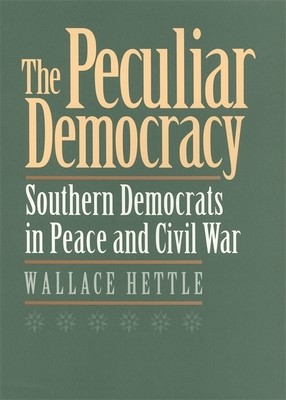
- We will send in 10–14 business days.
- Author: Wallace Hettle
- Publisher: University of Georgia Press
- ISBN-10: 0820340987
- ISBN-13: 9780820340982
- Format: 15.2 x 22.9 x 1.6 cm, softcover
- Language: English
- SAVE -10% with code: EXTRA
Reviews
Description
Too often, Wallace Hettle points out, studies of politics in the nineteenth-century South reinforce a view of the Democratic Party that is frozen in time on the eve of Fort Sumter--a deceptively high point of white racial solidarity. Avoiding such a "Civil War synthesis," The Peculiar Democracy illuminates the link between the Jacksonian political culture that dominated antebellum debate and the notorious infighting of the Confederacy. Hettle shows that war was the greatest test of populist Democratic Party rhetoric that emphasized the shared interests of white men, slaveholder and nonslaveholder alike.
The Peculiar Democracy analyzes antebellum politics in terms of the connections between slavery, manhood, and the legacies of Jefferson and Jackson. It then looks at the secession crisis through the anxieties felt by Democratic politicians who claimed concern for the interests of both slaveholders and nonslaveholders. At the heart of the book is a collective biography of five individuals whose stories highlight the limitations of democratic political culture in a society dominated by the "peculiar institution." Through narratives informed by recent scholarship on gender, honor, class, and the law, Hettle profiles South Carolina's Francis W. Pickens, Georgia's Joseph Brown, Alabama's Jeremiah Clemens, Virginia's John Rutherfoord, and Mississippi's Jefferson Davis. The Civil War stories presented in The Peculiar Democracy illuminate the political and sometimes personal tragedy of men torn between a political culture based on egalitarian rhetoric and the wartime imperatives to defend slavery.EXTRA 10 % discount with code: EXTRA
The promotion ends in 17d.10:45:03
The discount code is valid when purchasing from 10 €. Discounts do not stack.
- Author: Wallace Hettle
- Publisher: University of Georgia Press
- ISBN-10: 0820340987
- ISBN-13: 9780820340982
- Format: 15.2 x 22.9 x 1.6 cm, softcover
- Language: English English
Too often, Wallace Hettle points out, studies of politics in the nineteenth-century South reinforce a view of the Democratic Party that is frozen in time on the eve of Fort Sumter--a deceptively high point of white racial solidarity. Avoiding such a "Civil War synthesis," The Peculiar Democracy illuminates the link between the Jacksonian political culture that dominated antebellum debate and the notorious infighting of the Confederacy. Hettle shows that war was the greatest test of populist Democratic Party rhetoric that emphasized the shared interests of white men, slaveholder and nonslaveholder alike.
The Peculiar Democracy analyzes antebellum politics in terms of the connections between slavery, manhood, and the legacies of Jefferson and Jackson. It then looks at the secession crisis through the anxieties felt by Democratic politicians who claimed concern for the interests of both slaveholders and nonslaveholders. At the heart of the book is a collective biography of five individuals whose stories highlight the limitations of democratic political culture in a society dominated by the "peculiar institution." Through narratives informed by recent scholarship on gender, honor, class, and the law, Hettle profiles South Carolina's Francis W. Pickens, Georgia's Joseph Brown, Alabama's Jeremiah Clemens, Virginia's John Rutherfoord, and Mississippi's Jefferson Davis. The Civil War stories presented in The Peculiar Democracy illuminate the political and sometimes personal tragedy of men torn between a political culture based on egalitarian rhetoric and the wartime imperatives to defend slavery.

Reviews